Deleted
Deleted Member
Posts: 0
|
Post by Deleted on Dec 13, 2016 21:28:25 GMT
Liechtenstein will elect a new Landtag on 5 February 2017. The 25 members of the Landtag are elected by open list PR from the two constituencies Oberland (Balzers, Planken, Schaan, Triesen, Triesenberg and Vaduz) in the south with 15 seats and Unterland (Eschen, Gamprin, Mauren, Ruggell and Schellenberg) up north with 10 seats. There is an 8% threshold for each constituency, but that is of course usually rather theoretical in Unterland. Parties and seats in the current Landtag: Progressive Citizens' Party (FBP), NatCons, monarchist - 8 Patriotic Union (VU), Christian Democrats, pro-democratization - 10 The Independents (DU), alliance of anti-austerity centre-right independents - 4 Free List (FL) alliance of Social Democrats and Greens - 3 FBP leader Adrian Hasler has been PM since 2013 as head of a coalition with the Patriotic Union. Liechtenstein politics is ideal if you are Conservative as the choice essentially is between Conservatives and Very Conservatives. Though the left gained two seats last time and a new alliance of anti-austerity Indies led by a former Christian Democrat (and currency trader, this is Liechtenstein) got in. 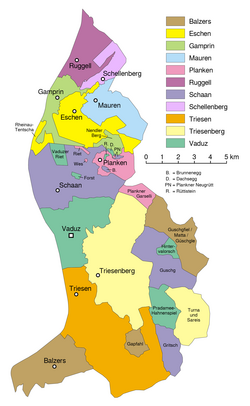 |
|
|
|
Post by No Offence Alan on Dec 13, 2016 21:30:52 GMT
Is there a pro-EU party?
|
|
Deleted
Deleted Member
Posts: 0
|
Post by Deleted on Dec 13, 2016 21:53:08 GMT
|
|
|
|
Post by Arthur Figgis on Dec 14, 2016 0:13:43 GMT
I went to Liechtenstein in September. It was basically closed. The three restaurants we tried were all closed, on a Saturday evening. We found a bar to try the local beer (the brewery tap was closed, of course), and then got the bus back to Feldkirch, where we were staying, and ate there instead.
|
|
|
|
Post by johnloony on Dec 15, 2016 2:01:23 GMT
There was a grand coalition between the Progressive Citizens' Party and the Patriotic Union continuously from 1938 to 1997. Until recently there were almost never more than 1 or 2 MPs from outside the 2 main parties.
|
|
|
|
Post by uhurasmazda on Dec 15, 2016 3:08:06 GMT
Popular vote map by municipality for the last election:  |
|
mondialito
Labour
Everything is horribly, brutally possible.
Posts: 4,961 
|
Post by mondialito on Dec 15, 2016 16:01:35 GMT
Hang on a mo, doesn't the Prince Regent have a veto over everything, rendering this something of a pointless exercise?
|
|
|
|
Post by Devil Wincarnate on Dec 15, 2016 16:42:46 GMT
I went to Liechtenstein in September. It was basically closed. The three restaurants we tried were all closed, on a Saturday evening. We found a bar to try the local beer (the brewery tap was closed, of course), and then got the bus back to Feldkirch, where we were staying, and ate there instead. That sounds like Eupen in Belgium. We went there on a public holiday and the pubs were empty. |
|
Deleted
Deleted Member
Posts: 0
|
Post by Deleted on Dec 15, 2016 17:09:47 GMT
Hang on a mo, doesn't the Prince Regent have a veto over everything, rendering this something of a pointless exercise? Well, he has the right to veto legislation and issue decrees, but there is a limit to how far he de facto can exercise that right. They have a Swiss style element of direct democracy and 1,000 citizens can initiate a referendum on any law (incl. changing the constitution), and the prince can not veto the result of a referendum. So the Prince also needs to be careful not to alienate the citizenry by interfering too much. The Liechtensteinians recognize that it is the princely family that gives the country its identity, but they are after all modern Europeans and there is a limit to how much they would accept the family sidelining parliament. The cabinet also needs to be approved by parliament. |
|
Deleted
Deleted Member
Posts: 0
|
Post by Deleted on Dec 15, 2016 17:27:26 GMT
The princely family has significant economic power and their ultimate weapon would be threatening to leave the country (which they used during the last constitutional crisis in 2002 to increase their powers). Before WW2 the House of Liechtenstein resided in Vienna, but their vast estates were confiscated as German property by the Czech and Polish government after the war, so they relocated to the principality (and then turned it into a financial center/tax haven). Originally the two domains that were merged to become the principality in 1719 were simply acquired to get the Liechtensteins a seat in the Reichstag as they previously held no land directly under the Emperor, the bulk of their landholdings and other economic interests lay elsewhere (with Bohemia and Moravia as the core). No Liechtenstein even visited the principality until 1818, 99 years after it was founded and 119 years after they bought the domain of Schellenberg (= Oberland).
|
|
|
|
Post by John Chanin on Dec 15, 2016 18:09:38 GMT
I looked up the population of Liechtenstein and at 37,000 it is rather bigger than I thought. Still it's a District Council election with candidates needing less than 1000 votes to be elected.
|
|
Deleted
Deleted Member
Posts: 0
|
Post by Deleted on Dec 15, 2016 18:31:16 GMT
I looked up the population of Liechtenstein and at 37,000 it is rather bigger than I thought. Still it's a District Council election with candidates needing less than 1000 votes to be elected. Well, its never a DC election when its held in a sovereign country. |
|
Eastwood
Non-Aligned
Politically restricted post
Posts: 2,122 
|
Post by Eastwood on Dec 16, 2016 15:57:12 GMT
I recommend the party and fireworks for Liechtenstein National Day on 15 August. Well worth visiting for if you are nearby.
I also recommend the village of Malbun, it is the eastern exclave of Triesenberg which I see voted VU. Lovely little village up in the mountains.
|
|
Georg Ebner
Non-Aligned
Roman romantic reactionary Catholic
Posts: 9,813 
|
Post by Georg Ebner on Jan 16, 2017 13:33:17 GMT
 I'll try to write something somewhen later. |
|
Deleted
Deleted Member
Posts: 0
|
Post by Deleted on Jan 16, 2017 16:30:20 GMT
Well, its never a DC election when its held in a sovereign country. I know Liechenstein is a sovereign country on paper, but how much real independence does it actually have? Thinking of other microstates and their relationships with their much bigger neighbours, San Marino is closely entwined with Italy, and Monaco with France. Definitely more, Liechtenstein is fx. a member of EFTA in its own right. The formal ties are that: - Switzerland represents Liechtenstein's interests and citizens abroad (incl. consulate services). - They have a customs union and Liechtenstein is using the Swiss franc, there are open borders and a common economic area (business licenses etc.) and patent system. - Switzerland can enter into treaties on Liechtenstein's behalf if its is not represented at the treaty negotiations (but that's hardly ever used outside of customs matters). Since Switzerland is so decentralized it matters less than if the bigger partner had been a centralized state. Besides both countries are pro-business and economically conservative, so its unlikely that Liechtenstein would have a desire to pursue a significantly different economic policy. |
|
Georg Ebner
Non-Aligned
Roman romantic reactionary Catholic
Posts: 9,813 
|
Post by Georg Ebner on Jan 16, 2017 17:48:49 GMT
I know Liechenstein is a sovereign country on paper, but how much real independence does it actually have? Thinking of other microstates and their relationships with their much bigger neighbours, San Marino is closely entwined with Italy, and Monaco with France. Definitely more, Liechtenstein is fx. a member of EFTA in its own right. The formal ties are that: - Switzerland represents Liechtenstein's interests and citizens abroad (incl. consulate services). - They have a customs union and Liechtenstein is using the Swiss franc, there are open borders and a common economic area (business licenses etc.) and patent system. - Switzerland can enter into treaties on Liechtenstein's behalf if its is not represented at the treaty negotiations (but that's hardly ever used outside of customs matters). Since Switzerland is so decentralized it matters less than if the bigger partner had been a centralized state. Besides both countries are pro-business and economically conservative, so its unlikely that Liechtenstein would have a desire to pursue a significantly different economic policy. Yes, but therefor they have adopted 99% of the EU-laws required within EFTA - the best (or rather worst?) quota of any state. Often they use "copy"&"paste".
|
|
right
Conservative
Posts: 18,772
|
Post by right on Jan 16, 2017 17:57:03 GMT
Definitely more, Liechtenstein is fx. a member of EFTA in its own right. The formal ties are that: - Switzerland represents Liechtenstein's interests and citizens abroad (incl. consulate services). - They have a customs union and Liechtenstein is using the Swiss franc, there are open borders and a common economic area (business licenses etc.) and patent system. - Switzerland can enter into treaties on Liechtenstein's behalf if its is not represented at the treaty negotiations (but that's hardly ever used outside of customs matters). Since Switzerland is so decentralized it matters less than if the bigger partner had been a centralized state. Besides both countries are pro-business and economically conservative, so its unlikely that Liechtenstein would have a desire to pursue a significantly different economic policy. Yes, but therefor they have adopted 99% of the EU-laws required within EFTA - the best (or rather worst?) quota of any state. Often they use "copy"&"paste".
Aside from immigration.... The interesting point is the adoption of laws. The assumption when talking about the "Norway Option" is that the three EFTA-EEA states at least simply adopt all laws sent to them by the EU. This is not true, but it would help the case for the Norway option if this was more widely known. |
|
Georg Ebner
Non-Aligned
Roman romantic reactionary Catholic
Posts: 9,813 
|
Post by Georg Ebner on Jan 31, 2017 18:36:45 GMT
Similar to Vorarlberg and InnerSwitzerland Liechtenstein did for obvious reasons not have the tiers of aristocracy or BurghMayors, the clergy – who hence dominated the intellectual life completely - alone wasn’t enough, so a torso-LandTag elected for centuries a “Landammann”, who was supervised by a governor sent from the principal house of LiechtenStein (=LightenStone) residing in Vienna&LowerAustria or Bohemia&Moravia. Absolutism and the reformism of the “Enlightenment” abolished these liberties and the princes modernized a rural&poor land, often against the farmers’ will. ~1872 a new constitution was granted, giving the country a Landtag with 15 members, 3 appointed by the prince, 12 elected indirectly. For decades where existed no parties, the Landtag met once a year, the government took normally over the laws of Cisleithania (with which - despite the public’s preference for Switzerland - the prince had concluded a contract for a TariffUnion, what let swiss TextileIndustry build fabrics in L. as an entry to the huge market of the DanubeMonarchy) and published them in the only NewsPaper, the “Liechtensteiner VolksBlatt”, which was thus subventionized by the government . Then – 1912 – a lawyer from Triesenberg/UpperLand, who had studied and exercised in Switzerland, came back and critized the freshly adopted austrian CraftLaw. After being ignored by the government, he secretly wrote letters to friends and assembled them in order to prepare an own candidacy for the Landtag in 1914. Shortly before the election he came out with a new NewsPaper, the “OberRheinische Nachrichten”. As a result, “the establishment” (whatever that means in a country of farmers) and the VolksBlatt began to strongly oppose them, announcing, that any parties damage the country’s unity, L. too small for 2 NewsPapers aso.. Interestingly, the Nachrichten suddenly claimed to be for “workers and small peasants” and miserable L.’s lots of MigratoryWorkers played a major role within the fresh movement, at least those working in Switzerland. Like USA’s Federalists, “the establishment” continued to play NonPartisanship (secret meetings, supporting some candidates of the other side,…), but the still nameless new movement captured 4/7 of the seats in the UpperLand (and didn’t run in the LowerLand). That lawyer was made ChairMan of a SpecialCommittee for constitutional&electoral reform and brought through the direct election of MPs. During the first WorldWar L.’s TextileIndustry collapsed (the Entente didn’t allow the import of yarn) and the proAustrian position of prince and the establishment became more and more indefensible. In 1918 both parties were founded, the proAustrian, “progress within the constitution” part establishing the “Fortschrittliche BürgerPartei/ FBP” (Progressive Citizens’Party), the proSwiss, proDemocratization faction the “ChristlichSoziale VolksPartei/CSVP” (ChristianSocial People’sParty) , the election in March ended FBP 7 to CSVP 5. In November 1918 the LandesVerweser (was) stepped down and all 12 elected deputies decided to nominate without asking the prince a provisorical government, an unconstitutional act of course - L.’s revolution! In 1922 “the Reds” won 11/15 mandates – trashing the “black” FBP - and as a consequence conquered the government. Although their majority was reduced to 9 in 1926’s 2 elections, L.s FiannaFail – for unknown reasons no scientist has ever made this comparison, but it appears obvious to me – seemed to be on way to rule the country for decades when L.s version of BlackFriday occurred: The bankruptcy of a bank, caused by the fraud of VU-members. SnapElections in 1928 let FBP reconquer its dominance (11/15), which held on for 42 years, until 1970. After introducing a new ElectoralSystem – 1 seat for each of the 10 bigger municipalities, 5 for the smallest munic. and the whole “nation” -, which was perceived as unfair by the CSVP, resulting in ElectionBoycotts and a bad atmosphere. That quarrelling and the general mode for replacing parties by ProfessionalGuilds (“Stände”/“tiers”) stood behind the “Liechtensteiner HeimatDienst/LHD” (“L.HomelandService), a small movement close to the austrian HeimWehr and very close to the Swiss Frontists, so partly inspired by Mussolini or Hitler (but not necessarily). CSVP and LHD decided to merge for tactical reasons and while the PartyProgram of the new “Vaterländische Union/VU” (“Patriotic Union”) ignored nearly entirely any alternative to MultiParty-democracy and the “masses” derived from the CSVP, LHD’s (too) many would-be Führer led the VU for one generation. (One historian called this the main reason for VU’s long series of electoral failures.) The real NationalSocialists formed their own party and immediately after the Anschluß of Austria on March 12th 1938 L. was close to be overrun by local SS-units from Feldkirch (Hitler himself opposed an annexation straightaway for diplomatic reasons.) , a CoupAttempt of the inborn Nazis failed burlesquely, 96% of all eligible voters signed a petition for independence and a continued TariffUnion with SwitzerLand. In order to avoid any noise, FBP and VU began their GrandCoalition (lasting for 60 years, until 1997) and introduced the present ElectoralSystem (but with a 18%-treshold). Making a UnityList (FBP 8, VU 7) that was unopposed, “silent elections” took 1939 place, so none, prolonged during the war. We also do not have really VoteNumbers before 1945, 1936 was (according to H.Michalsky) FBP:VU=52%:48%. 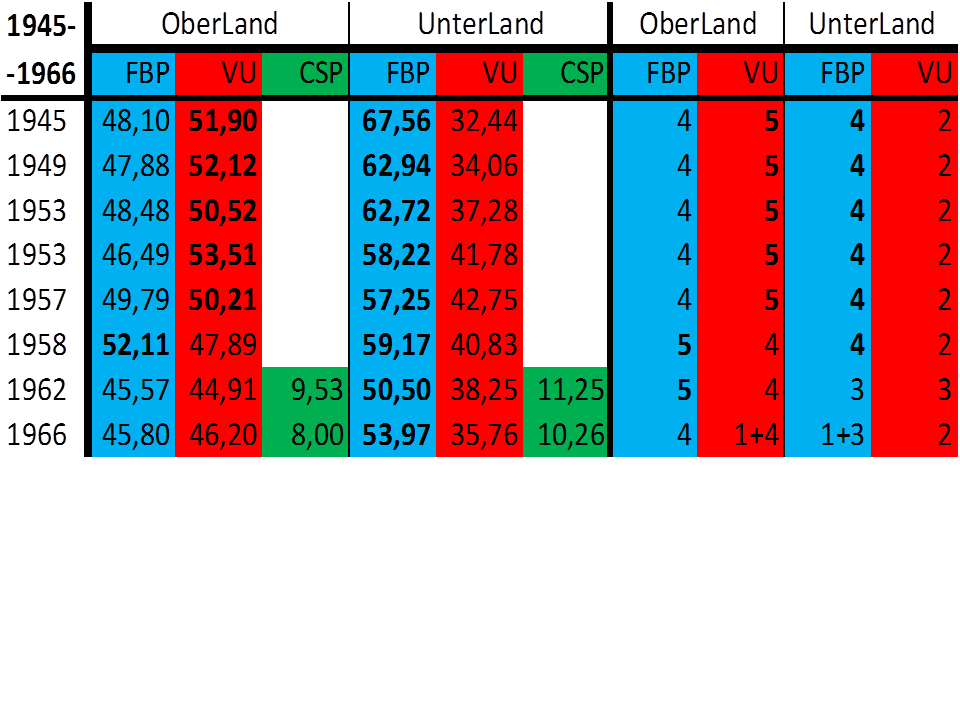 After the WorldWar L. saw a huge economical surge, what reduced the sociological differences between FF and FG even further (including a shrink between Upper-&Lower-Land), still it was quite inimaginable to switch the parties (if You are looking for contemporary Romeo&Julia-dramolettes…). Many assume L. to consist of alpine pastures plus banks, but the agriculture is quasi extinct and the BankingSector - officially 100 billions by 20.000 (2008: 50.000) trusts per 36.000 inhabitants - accounts for only 2/6 of their GDP and 1/6 of the jobs, while over 40% (!) still work in the HighQuality-industry. But only ~13% are organized in TradeUnions, what explains, that a party created by them (ULL) received only 6.9% in 1953. A “ChristlichSozialePartei/CSP” (1962: 10.1%, 1966 8.7%, …) urged successfully via SupremeCourt to lower the threshold (since then 8%), but it was too late for them. The 1970ies were electorally unsteady, followed by a long reign of VU (1978-1993), in the latest quarter of century once again volatility, this time with 3-4 parties: The “Freie Liste/FL” (FreeList) emerged from ecologist groups, the Fundi-wing of “the Whites” being led by frustrated feminists (female suffrage was adopted in the third [!] referendum in the 1980ies). Initially FL refused to participate in coalitions, but this has changed. 2013 VU-deputy W.Quaderer(Schaan/UpperLand) left the faction due to “authoritarian tendencies” within the faction and founded “Die Unabhängigen/DU” (“The Independents/YOU”). DU’s platform hasn’t, though their PartyLeader has sometimes played with XenoPhobia during the present campaign. 1997 the small Swiss company IHA-GfM conducted L.s first “ExitPoll” (=PhonePoll on ElectionDay; n=769), which found expectably rather low differences between “FF” and “FG”; the main distinction was despite all modernization “frequent ChurchAttendance”: FBP 3/6, VU 2/6, FL 1/6; Liechtenstein’s FineGael hosted the wealthier&healthier (few divorced, few flat-rentings, few immigrated), keener on culture&internationalism (thus the voters of the “harder” VU/FF supported the conservative ArchBishop of Vaduz slightly more). In recent years voters have put sometimes VU right to FBP: 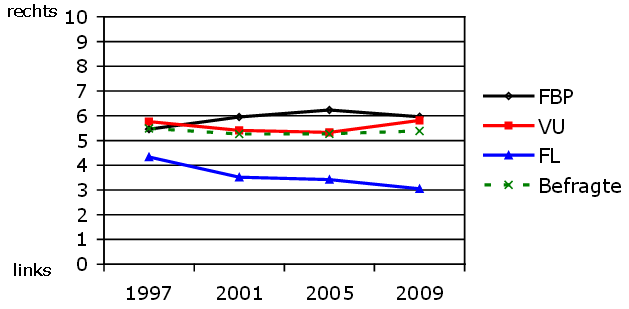 A survey of W.Marxer on PartyPrograms: 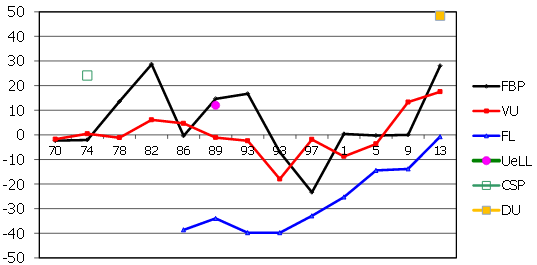 Important is, that there exists a cult of being “moderate”: Many citizens – including actually the FL – define themselves in that way: 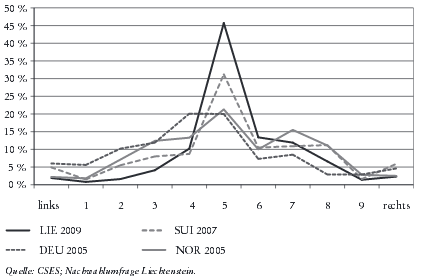 The trust in parties remains very high: 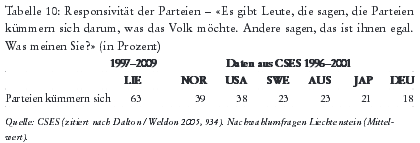 The incumbent FBP+VU-coalition had to make cuts, but their impact is said to have healed, PM Hasler is – claims the NZZ in Zurich – popular. FBP’s “VolksBlatt” (L. has again only - besides TeleVision and radio - the 2 dailies of the 2 GovernmentParties) published a poll in December 2015 (n=?): VU 34.5% (+1.0%), FBP 31.3% (-8.7%), DU 21.0% (+5.7%), FL 13.1% (+2.2%). Polls are opened this SunDay from 10.30 to 12.00 MET, but with their possibility to panachage the first results aren’t expected before 14.00 MET. Links: Official site: www.landtagswahlen.li/FBP’s „L. VolksBlatt”: www.volksblatt.li/VU’s „L. Vaterland“: www.vaterland.liRadio: www.radio.li/TeleVision: www.1fl.li/ |
|
Georg Ebner
Non-Aligned
Roman romantic reactionary Catholic
Posts: 9,813 
|
Post by Georg Ebner on Feb 5, 2017 12:45:20 GMT
A lower TurnOut is reported in traditionally "black" (=FBPish) municipalities.
The average of several forecasts is VU9:FBP8:DU5:FL3.
NailBiting continues....
|
|
Georg Ebner
Non-Aligned
Roman romantic reactionary Catholic
Posts: 9,813 
|
Post by Georg Ebner on Feb 5, 2017 13:37:32 GMT
First municipality counted - Schellenberg, where a relative of mine was priest once:
42.9 +0.8 FBP
31.4 -0.6 VU
13.6 +0.2 DU
12.1 -0.5 FL
Indicates, that there won't be much change.
|
|